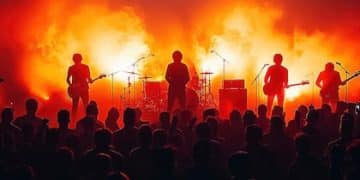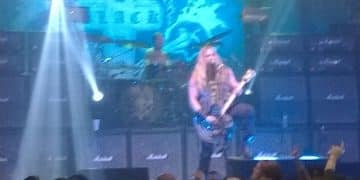The Impact of Social Media on Heavy Metal Concerts: A Global Connection
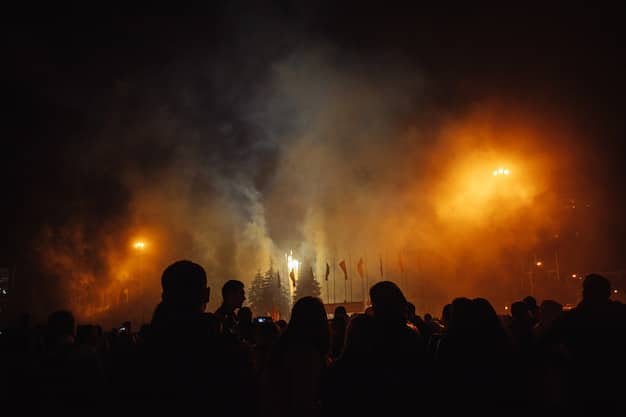
Social media’s impact on heavy metal concert culture connects fans worldwide, fostering community, sharing experiences, and impacting event promotion and audience engagement.
The rise of social media has profoundly shaped the landscape of heavy metal concert culture, transforming how fans connect, share experiences, and engage with their favorite bands. The impact of social media on heavy metal concert culture: Connecting fans worldwide is undeniable, creating a global community that transcends geographical boundaries.
The Evolution of Heavy Metal Concert Culture
Heavy metal concert culture has a rich history, evolving from underground gatherings to massive stadium events. Social media has become a crucial element in shaping and amplifying this culture, fostering a deeper connection among fans worldwide. This evolution reflects broader trends in music consumption and community building.
From Local Scenes to Global Networks
In the decades before widespread internet access, heavy metal scenes were largely localized. Fans connected through word-of-mouth, local record stores, and fanzines. With the advent of social media, these local scenes have expanded into global networks. Platforms like Facebook, Twitter, and Instagram enable fans from different countries to share their passion for heavy metal music.
The Role of Early Internet Forums
Before social media, internet forums were among the earliest online platforms for metal fans. These forums served as digital meeting places where users could discuss music, share concert experiences, and organize local meetups. Although basic by today’s standards, these forums laid the groundwork for the social media-driven community that exists today.
- Fan-generated content, such as concert photos and videos, helps broaden the reach of local metal scenes.
- Online communities enable fans to discover and support bands from different parts of the world.
- Social media platforms allow direct communication and interaction between bands and their fanbase.
- Heavy metal concert culture is now more accessible and inclusive thanks to the affordances of social media.
The transition from physical, localized scenes to digital, global networks has redefined heavy metal concert culture. Through creating online communities, fans can connect with other fans all over the world and continue to expand the recognition of heavy metal music.
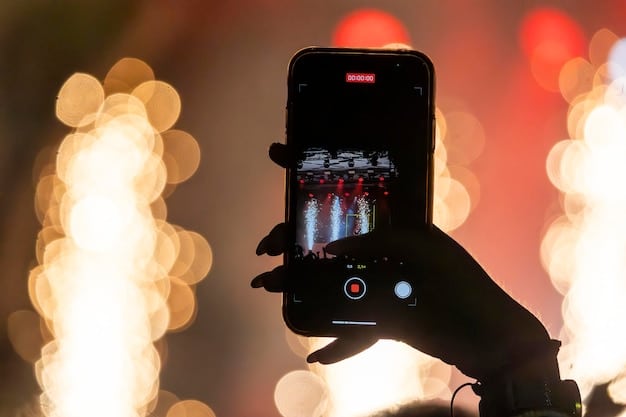
Social Media Platforms and Heavy Metal Concerts
Various social media platforms have become integral to the heavy metal concert experience, each offering unique features that enhance fan engagement. From Instagram and Twitter to dedicated metal communities on Reddit, these platforms provide diverse avenues for fans to connect, share, and revel in their mutual love for the music.
Instagram: Visualizing the Concert Experience
Instagram, with its emphasis on visual content, is a perfect medium for sharing the energy and excitement of heavy metal concerts. Fans post photos and videos of the bands, the crowd, and the overall atmosphere. Instagram stories allow for real-time updates and behind-the-scenes glimpses, creating a sense of immediacy that draws other fans in.
Twitter: Real-Time Reactions and Interactions
Twitter serves as a real-time commentary platform for heavy metal concerts. Fans use the service to post live updates, share their instant reactions to the music, and engage with other concert-goers. Bands and venues also use it to communicate important information, such as last-minute schedule changes or stage announcements.
Facebook: Community Building and Event Promotion
Facebook remains an essential tool for building communities around heavy metal music. Bands create pages to connect with their fans, announce tour dates, and share exclusive content. Facebook groups dedicated to specific bands or subgenres enable fans to discuss and organize concert meetups.
- Live streaming on platforms like Facebook Live and Instagram Live gives fans who cannot attend in person the opportunity to experience the concert atmosphere.
- Hashtags are used to aggregate content related to specific concerts or bands, creating a centralized location for fans to find and share information.
- Fan-made videos and playlists shared on YouTube provide an ongoing celebration of the heavy metal genre and specific concert experiences.
- Platforms such as Reddit and Discord host dedicated metal communities where fans can share news, reviews, and concert experiences in a more structured format.
The different features of each social media platform enable fans to connect, share, and revel in their mutual love for the music. Fans can now come together across different platforms to engage with one another.
Building Community Through Social Media
Beyond merely sharing content, social media platforms serve as vital hubs for building and nurturing communities within the heavy metal scene. These online communities strengthen the bonds between fans worldwide. They also provide a space for sharing experiences and connecting around mutual interests.
Creating Online Fan Clubs
Social media has enabled the creation of countless online fan clubs dedicated to specific heavy metal bands. These clubs provide a forum for fans to connect, share their passion, and organize activities such as attending concerts together. Fan clubs often host online discussions, share exclusive content, and even arrange meet-and-greets with band members.
Organizing Concert Meetups
Another vital function of social media is facilitating the organization of concert meetups. Fans use Facebook groups, Twitter hashtags, and other platforms to find other concert-goers and arrange to meet up before, during, or after the show. These meetups enhance the sense of community and create lasting memories.
The Role of Influencers and Bloggers
Influencers and bloggers play a significant role in shaping the heavy metal community. Some metal enthusiasts dedicate their time to creating concert blogs filled with concert dates for heavy metal artists.
- Fans gain recognition within the heavy metal community through sharing their concert experiences.
- Social media provides valuable networking opportunities for musicians, promoters, and industry professionals.
- Many heavy metal bands connect with their fans by directly engaging on social media.
- Social media platforms are hosts for discussions and debates about the genre, its subgenres, and evolving trends.
Within the heavy metal scene, social media is more than just sharing content; it builds and nurtures communities. The online communities strengthen bonds between fans all over the world, and creates spaces for sharing experiences.
Social Media as a Tool for Event Promotion
Social media has become an indispensable tool for promoting heavy metal concerts and festivals. Bands, venues, and promoters rely on these platforms to reach their target audiences and drive ticket sales. Effective marketing strategies through social media can significantly impact the success of a concert event.
Targeted Advertising
One of the most powerful features of social media advertising is the ability to target specific demographics. Promoters can create ads that are shown only to users who have expressed an interest in heavy metal music. This ensures that the marketing efforts are focused on the most likely concert-goers, improving the return on investment.
Announcements and Ticket Sales
Social media platforms are ideal for announcing concert dates, venues, and ticket sales. Bands often use their official pages to post updates, behind-the-scenes content, and promotional materials. Ticketing platforms also integrate social media features, allowing fans to purchase tickets directly through these platforms.
Creating Hype and Engagement
Creating hype and engagement is crucial for a successful concert. Social media allows promoters to release exclusive content, such as previews of new songs or behind-the-scenes footage of the band preparing for the show. Promoters can also run contests or give away tickets to encourage fans to share content and spread the word.
- Social media campaigns can significantly boost ticket sales and attendance rates for heavy metal concerts.
- Engaging content, such as live videos and fan testimonials, creates a buzz around the event.
- Influencer marketing, where social media personalities promote the concert, can reach a wider audience.
- Tracking social media engagement metrics enables promoters to refine their marketing strategies and improve their outcomes.
Social media is now an essential tool for heavy metal concerts and festivals. Bands, venues and promoters depend on social media to connect with their audiences and sell more tickets.
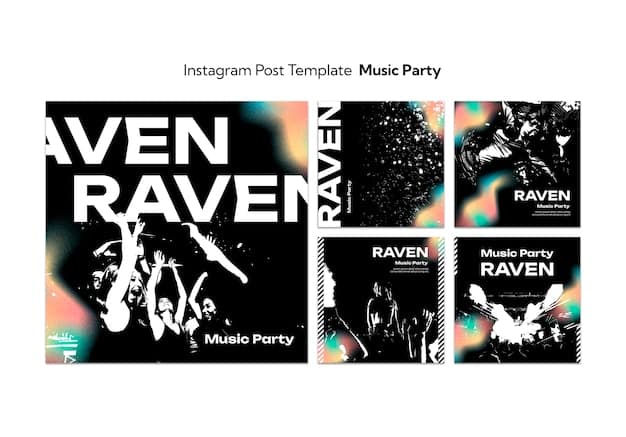
Challenges and Criticisms
While social media has many benefits for the heavy metal concert culture, there are also challenges and criticisms to consider. These include issues related to authenticity, privacy, and the potential negative impacts on the live concert experience. Examining these challenges is essential for a balanced perspective.
The Authenticity Debate
One common criticism is that social media can detract from the authenticity of the live concert experience. Some argue that fans may focus more on capturing and sharing content than on fully immersing themselves in the music. This can lead to a sense of detachment from the performance and a diluted experience, critics claim!
Privacy Concerns
Privacy concerns are another significant consideration. Concert-goers who share photos and videos on social media may inadvertently expose personal information. There are also debates around the privacy of venues and performers who are recorded and broadcasted without their explicit consent.
Negative Impacts on Live Experience
Social media could be seen as a source of distraction during live performances. Some argue that the constant urge to check phones and post updates interferes with the concert experience and diminishes the communal atmosphere. Also, concerns around cyberbullying can be raised, especially during live concerts.
- Social media validation can incentivize some fans to prioritize appearance over genuine participation.
- The fast-paced nature of social media contributes to a shorter attention span, making it harder to fully appreciate longer, more complex musical performances.
- There’s a dark side to social media, with hate speech making its way in metal communities.
- Concert promoters need to address cybersecurity concerns when collecting and using fans’ data.
Although social media might bring many positives to the heavy metal concert culture, we need to consider the negatives and criticisms, for example, authenticity, privacy, and the impacts on the show.
The Future of Social Media and Heavy Metal Concerts
Social media will continue to evolve, shaping the future of heavy metal concert culture in various ways. From augmented reality enhancements to more personalized engagement strategies, the possibilities are vast. Considering these future trends can help bands and fans prepare for the next wave of digital transformation.
Augmented Reality (AR) Enhancements
Augmented reality (AR) has the potential to revolutionize the live concert experience. Imagine holding up your smartphone and seeing additional information about the band overlaid on the stage. AR could also enable interactive elements, such as virtual merchandise displays or collaborative art projects.
Personalized Engagement Strategies
As social media platforms become more sophisticated, personalized engagement strategies will become increasingly important. Bands can use fan data to tailor their content and messaging, creating a more individualized experience for each fan. This could include personalized recommendations for merchandise, concert updates, or even meet-and-greet opportunities.
Hybrid Events
Hybrid events, which combine in-person and virtual elements, are likely to become more common. These events allow fans who cannot attend in person to still participate in the concert experience through live streams, virtual meet-and-greets, and interactive online activities. This could create more inclusive and broader fan events.
- Virtual reality (VR) concerts may offer fully immersive experiences, allowing fans to feel as if they are on stage with the band.
- Artificial intelligence (AI) can be used to analyze social media data and provide insights into fan preferences and behaviors.
- Blockchain technology may provide secure and transparent ticketing solutions, reducing fraud and scalping.
- Enhanced data security to protect fan privacy and prevent scams related to concert tickets.
Social media will continually evolve in the future and shape the heavy metal concert culture. AR Enhancements, personalized engagement strategies, and hybrid events look like the next technologies being integrated into the heavy metal scene.
| Key Point | Brief Description |
|---|---|
| 🎵 Community Building | Social media connects heavy metal fans globally. |
| 📢 Event Promotion | Platforms are used for targeted advertising and updates. |
| 📸 Visual Sharing | Instagram creates a real-time commentary venue. |
| 🛡️ Privacy Concerns | Posting content can expose fans’ personal information. |
Frequently Asked Questions
▼
Social media has transformed heavy metal concerts, enabling a global community for fans to connect and share their experiences, enhancing overall engagement and event promotion.
▼
Heavy metal fans frequently utilize platforms such as Instagram, Twitter, Facebook, Reddit, and YouTube to interact, share content, and discuss music and concerts.
▼
Bands use social media for targeted ads, event announcements, ticket sales, exclusive content releases, and building fan hype to promote upcoming concerts.
▼
Concerns include reduced authenticity, privacy risks, and attentional distractions, negatively impacting the real-time live concert experience and diminishing the communal atmosphere.
▼
Future developments include use of augmented reality (AR), personalized fan engagement, hybrid events, and virtual reality (VR) concerts, enhancing the immersive concert experience.
Conclusion
In conclusion, social media has revolutionized heavy metal concert culture, creating unprecedented global connections among fans, transforming event promotion, and opening up new avenues for bands to engage with their audiences. While challenges exist, the integration of these technologies is poised to shape future concert experiences, offering vast potential for the heavy metal community.

